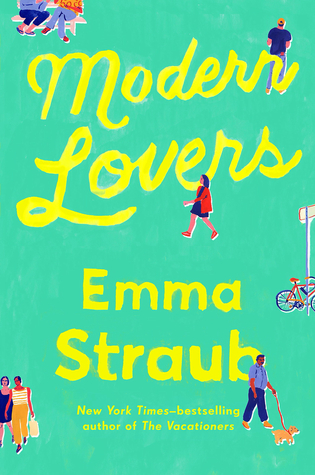Modern Lovers is my first Emma Straub book, and I ended up really enjoying it. This semester, I’m trying to really start reading for pleasure again after many semesters when that seemed possible because of all the reading I had to do for class. And this book is pretty perfect for getting you back into that mood to read; it’s light and funny, with short chapters that fly by quickly, but it’s not just empty fluff. It has interesting points to make, and it’s smart.
The first half is a tad slow. The short chapters and fun characters make it enjoyable and breezy, but there’s no one central conflict, which makes the story ultra low-concept; it’s basically a story about two families and their various relationship dynamics, which doesn’t make for a catchy logline, really. You could say it’s about two marriages that are on the brink of failure, one fraught with years of tension and contention and one haunted by a slowly building sense of complacency and buried secrets. You could also say it’s about a teen romance that threatens the stability of the kids’ parents’ friendships. You could also focus on the character of Lydia and the band that she once created with the parents and say that the story is about how it’s difficult to move on from the past, how old events and old tensions can linger years afterward. All of these coexisting stories fit together well in retrospect, but as you’re reading the first half, it’s a bit difficult to see how they’ll build off each other. The first half feels like a time to just hang out with the characters and get to know them a little bit. It’s mostly fun, but occasionally it feels too directionless.
In the second half, the dominoes start to fall, and the conflicts build, and that’s really where the story starts to speed up. Straub is smart about depicting the conflicting ways people view their relationships; Harry views Ruby, for example, as the clear love of his life, but it’s clear to us even without seeing her point of view that she views their relationship differently. Then we get to see her perspective and learn that she really thinks of Harry as a pet project, a fun diversion where she’s able to ‘practice’ saying she loves someone, because all teenage love is performative. It’s sad to see Harry so delusional in his infatuation for Ruby when she looks down a bit at him, but it’s also sweet, and the story sidesteps the big, cliche confrontation scenes where Harry and Ruby might get into a fight about what their relationship means, or have a melodramatic breakup. I like how their story ends, with them agreeing to break up when Ruby arrives at the airport. Their relationship clearly meant something to each of them, and even if those interpretations were different, that doesn’t mean either was wrong. In the end, the story of Harry and Ruby is a hopeful one. Ruby’s flashforward to imagining her and Harry seeing each other at reunions years down the road was one of the most emotionally potent scenes of the book for me.
If I have a complaint with the second half, it’s that the whole thing works out a little too perfectly. To be honest, I was hoping one of the marriages would end, preferably Elizabeth and Andrew’s. I like the idea that the real failing marriage wasn’t the one fraught with disagreement and jealousy (Zoe and Jane), but the one that seemed stable but wasn’t. The other issue, I think, is that I just really disliked Andrew throughout almost the entire book. The EVOLVEment subplot, in which Andrew basically joins a cultish group of hippies who do yoga and drink kombucha, was a bit cringey and annoying for me, even though it’s clear Straub is satirizing the concept and explaining why it holds appeal for Andrew, not endorsing it for everyone. Despite that self-awareness on Straub’s part, though, the EVOLVEment setting took up too much space in the story for me, and I disliked the character of Dave.
In general, Andrew just seemed very selfish and cold to me. Even when he made good points (Elizabeth, of course, shouldn’t have forged his signature to allow the movie studio to use their song), I felt no sympathy for him, because he’d been lying about cheating on Elizabeth with Lydia, because his reasons for turning down the movie deal were selfish. Even when he and Elizabeth got into the fight, Andrew just assumed everything would work out fine for them, and I wished the story punished him more for it. While I’m glad that Zoe and Jane were able to repair their marriage, that, too, seemed a tad too easy; they basically went on one rare date, they had sex, and Jane admitted she was jealous of Elizabeth, and that was it. They were fixed.
There’s also something a bit too perfect about the ending, socioeconomically speaking. Yes, I understand that these people are all well-off, so there are reasonable explanations for how they’re able to overcome their financial issues so easily, but it’s still just…too easy, you know? The fact that Ruby just moved to Mexico and opened up her own pizza place, and Jane and Zoe were able to just open this new pastry shop without any issues…not all couples have the option to spontaneously create a new business together to fix their marriage and start anew. I wanted to see each character find ways to grapple with their issues without throwing money at the problem, and I didn’t really get that.
Still, though I occasionally hoped for a deeper exploration of these characters’ issues and the ways they could fix them, I ultimately really enjoyed Modern Lovers. It’s light, fun, and filled with relatable scenarios and characters. I’ll definitely be checking out more of Emma Straub’s stuff.
Grade: B+



Leave a Reply
Be the First to Comment!